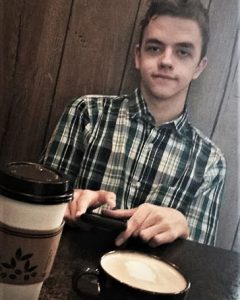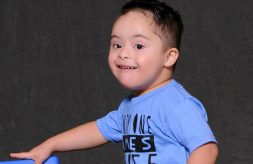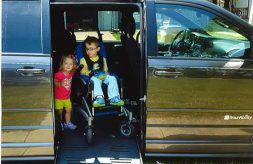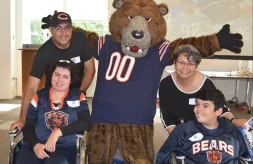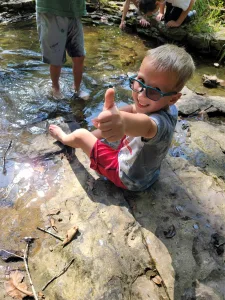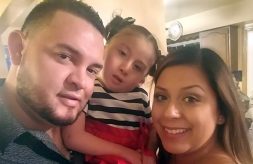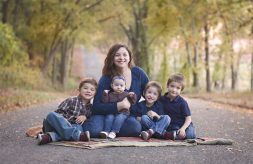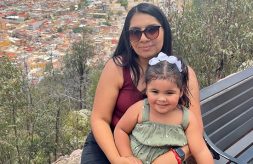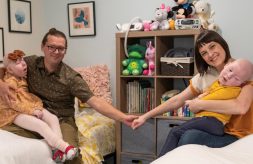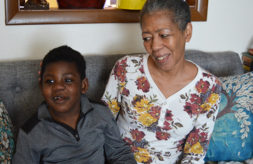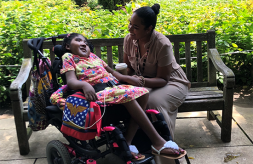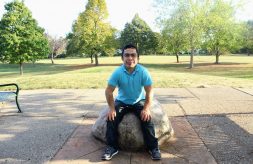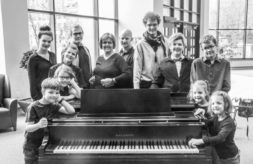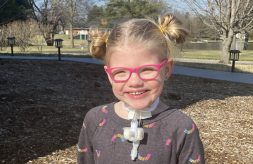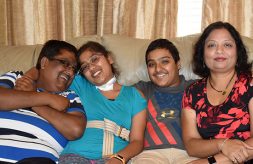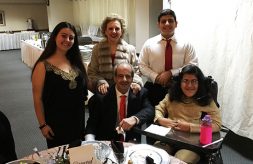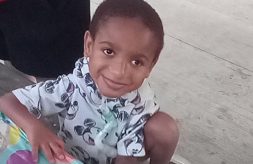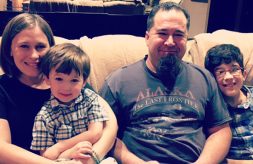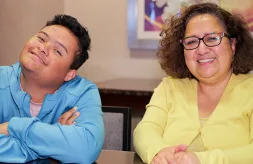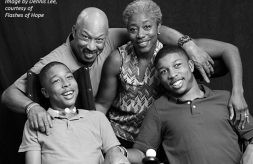The Monical Family
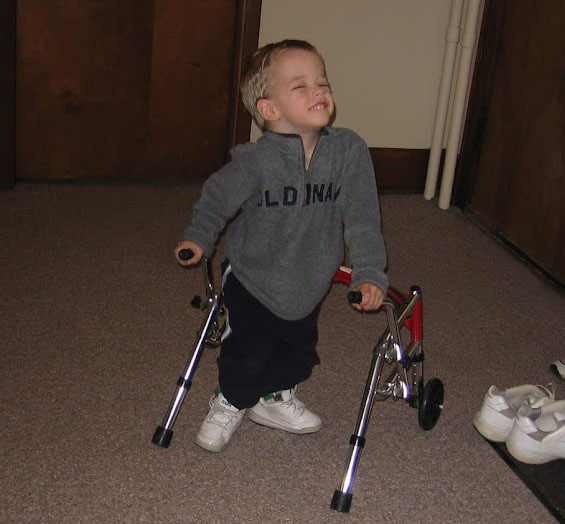
“The Division of Specialized Care for Children has been incredible since the start”
— Collin's mom, Christine Monical
“We’re grateful for DSCC’s help. They’ve always been there for us.”
Collin Monical was born with abnormalities of the hips, feet and legs, including a dislocated hip.
A surgery to relocate his hip led to a severe infection that further damaged his ball-and-socket joint.
Collin experienced developmental delays and numerous hurdles but grew up determined to be considered a typical kid.
The University of Illinois Chicago’s Division of Specialized Care for Children (DSCC) helped Collin and his family get the right equipment for his developing mobility needs as he grew. His DSCC care coordination team also provided guidance and resources to help Collin and the Monicals navigate each transition of Collin’s life.
Now 21, Collin is happily employed and ready to take on adulthood with the same determination he showed throughout childhood.
Collin’s parents, Greg and Christine, appreciate DSCC for supporting Collin and helping him fulfill these goals.
“We’re grateful for DSCC’s help. They’ve always been there for us,” said Greg.
“Incredible from the start”
The Monicals first relied on DSCC for help with obtaining Collin’s orthotics. Orthotics are braces that allow additional stability while standing and walking.
As Collin grew, he would need new orthotics to replace the old ones. The Monicals say DSCC was helpful each time.
“When he was just a toddler, DSCC helped us get a platform lift that made it possible for him to be at the table with us in an upright position. It made such a difference,” Greg said.
Christine agreed. “The Division of Specialized Care for Children has been incredible since the start,” she said.
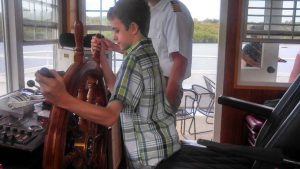
Collin, 12, is not just enjoying the cruise, he has taken the helm and is concentrating on steering the boat with guidance from the captain.
From addressing Collin’s medical and educational needs to later fostering his independence and employment goals, DSCC has played an important role in Collin’s journey.
Kristin Lenover is Collin’s current DSCC Care Coordinator. “I have helped with things such as resolving a medical bill issue to walking through what they want the next steps of their lives to look like,” Kristin said. “I provide resources to help families and their children navigate private and public benefits, college scholarships, obtaining medical equipment and even tax preparation.”
Strength in helping others
DSCC covered the costs for the Monicals to attend the Illinois Statewide Transition Conference together in 2019. DSCC helps sponsor and plan the conference, which highlights the opportunities and resources available for youth as they prepare for adulthood.
Collin and his parents benefited from the range of conference session topics, including government benefits, education supports, the financial aspects of transition planning and self-advocacy.
One especially impactful conference session for Collin focused on matching an employee’s strengths to the employer’s needs.
Collin’s strength is interacting with others, which he’s proudly shown in each of his jobs to date.
“My first job in high school was the electronics department of a major national chain. I grew to be very knowledgeable about cell phones and many other products,” Collin said. “Dad would often have co-workers approach him saying, ‘Yeah, I was out at Walmart and met a very nice young man.’ Dad would encourage them to elaborate.”
After almost two years at Walmart, Collin began work at Taco Bell. He also upgraded from a Rollator walker to an upright style.
“I had some of my regular customers let me know that I was looking better.” Collin said of his posture. “This made me stand even taller. People ask me about an upright walker, and I highly recommend one.”
Collin eventually left Taco Bell to work at Wally’s Travel Center, where he continues to work today.
“The place is really big and always busy! There are 76 fuel pumps, electric charging stations, food and merchandise. We see lots of truckers, businessmen and families coming in with questions or needing help to find stuff,” he said.
Collin rings up purchases and helps customers find what they need.
“I often work a 10-hour day. I really enjoy it and don’t shy away from picking up extra hours,” he said. “I’m most content during my day when I’m making others happy.”
“Move forward with confidence”
Kristin is happy to see Collin pinpoint his strengths and use them in the transition to adulthood.
“Helping individuals move forward with confidence when they turn 21 is so important,” she explained. “It’s important for Collin to be able to navigate and better understand things like insurance and benefits, financial planning, taxes and moving from pediatric specialists to adult care.”
Now that Collin is 21, he is ready to age out of DSCC’s Core Program. It’s a milestone that Collin, his parents, and Kristin have worked together to achieve.
Collin said he is truly happy as he starts this new chapter. He looks forward to helping more Wally’s customers with a kind attitude and big smile.
“Always remember, ‘You may be the best part of someone else’s day,’” Collin said.
The Miller Family
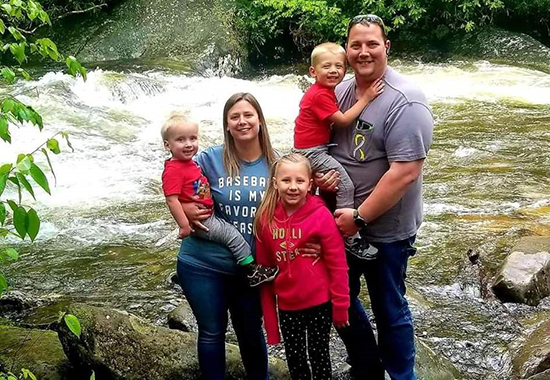
“(The Division of Specialized Care for Children) has been a saving grace."”
— Ryker's dad, Brad Miller
“DSCC has been there through all of it”
Watching your child take their first steps is an emotional moment for any parent.
For Brad and Amy Miller, the milestone represented all the obstacles their son Ryker has overcome in his short life.
Ryker, age 6, was born with spina bifida and a structural defect in his brain called Chiari malformation. He’s had 11 surgeries, a tracheostomy, a gastrostomy tube and many hospitalizations.
In May 2020, Ryker took his first steps without assistance.
“It was very emotional and basically a long-time coming,” Brad said. “We are well aware of other kids with spina bifida who will never walk, never take a step, even with a walker.”
Ryker’s mom, Amy, captured the moment on video (see below).
“It might look like nothing to most, but for Ryker and children with spina bifida, this is huge,” Brad said.
The Millers want to share Ryker’s journey to help educate others about spina bifida and provide hope for other families.
The diagnosis
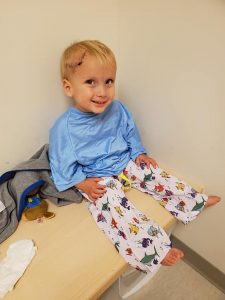 Brad and Amy Miller had a 5-year-old daughter when they became pregnant with twin boys, Ryker and Carter. At the twins’ 26-week appointment, they learned Ryker had spina bifida.
Brad and Amy Miller had a 5-year-old daughter when they became pregnant with twin boys, Ryker and Carter. At the twins’ 26-week appointment, they learned Ryker had spina bifida.
“We didn’t know anything about it at the time,” Brad recalled. “We thought it was a death sentence.”
Spina bifida occurs when the spine and spinal cord don’t form properly. Ryker had the most severe type in which the spinal canal is open along the lower back, forming a sac. Additionally, Ryker had hydrocephalus, the buildup of fluid in the brain.
Ryker had surgery to close his spinal canal shortly after birth. He also had a shunt surgically inserted to drain the excess fluid from his brain.
Later, he started having difficulty breathing.
Ryker was transferred to St. Louis Children’s Hospital, where he was diagnosed with Chiari malformation. Chiari malformation is a condition in with brain tissue extends in the spinal canal.
Worried that Ryker would not be able to breathe on his own, doctors performed a tracheostomy.
Ryker also underwent a duraplasty. In this procedure, a surgeon opens the cover of the brain, called a dura, and sews a patch on it to make it bigger. This surgery relieves pressure on the brain.
“They did the surgery but were not optimistic it would help,” Brad recalled. “Lucky for us and for Ryker, it actually did help, and he started to breathe on his own again.”
“A saving grace”
Ryker spent the first three months of his life in the hospital, including 56 days in the pediatric intensive care unit at St. Louis Children’s.
The Millers struggled with how to balance staying with Ryker in the hospital while also caring for another newborn and a 5-year-old daughter at home.
During that time, Brad said the University of Illinois Chicago’s Division of Specialized Care for Children (DSCC) provided invaluable help.
DSCC covered the cost of the suggested donation for the entire Miller family to stay at the Ronald McDonald House during Ryker’s hospitalization at St. Louis Children’s.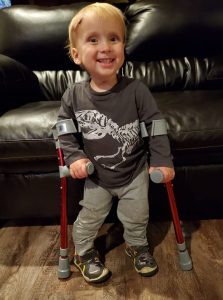
“That was a saving grace for us, so we could actually be together at night as a family of four and spend every other waking minute at the hospital with Ryker,” Brad said. “I don’t know how we would have done it without that (assistance).”
DSCC continued to support the Millers as they navigated Ryker’s homecoming and learning his long-term care needs.
“He’s had a lot of follow-up appointments, and DSCC has been there through all of it,” Brad said.
Many of Ryker’s specialists are based outside of the Miller’s hometown, more than an hour’s drive away.
DSCC has helped arrange hotel stays if the family has an early appointment and has helped coordinate different providers’ schedules to find the best options for Ryker and the Millers.
“DSCC has been a saving grace in just the logistics of trying to do scheduling,” Brad said.
“There’s no mountain too high for him.”
With each passing year, Ryker continues to grow stronger. He is now in first grade.
In October of 2023, on a family outing to Giant City State Park, Ryker accomplished a new feat. He went rock climbing.
“We didn’t think Ryker was going to take off, but we didn’t want to stop him. He proved us wrong like he has done so many times,” Brad said.
Ryker’s twin brother and older sister also climbed the rock and knew what an accomplishment this was for their brother. “Ryker’s siblings were happy to see him up there. They were proud, they were excited. They climbed it, they knew it wasn’t easy,” Brad said.
Brad and Amy once again captured this milestone on video (see below) .
The climbing video was featured on the family’s Facebook page, Ryker Miller’s Journey. The page provides regular updates about Ryker’s medical procedures and overall life with spina bifida.
Brad wants parents to know that spina bifida is manageable and not the “death sentence” he and Amy initially feared.
“He can do a ton of things. He’s always smiling, and he will melt your heart,” Brad said. “There’s no mountain too high for him.”
Going forward, Brad said he and Amy want to do whatever they can to help support Ryker’s independence.
“We are so proud of him. For those first three months (of Ryker’s life), it was a blur. I honestly don’t know how we survived it, but we did. It’s made us stronger as a family and as individuals,” Brad said.
“We want to thank everyone at DSCC and give a big shout-out to Ryker’s entire medical team, from the doctors, nurses and therapists. We are lucky to have an amazing team on Ryker’s side.”
The Lyons Family
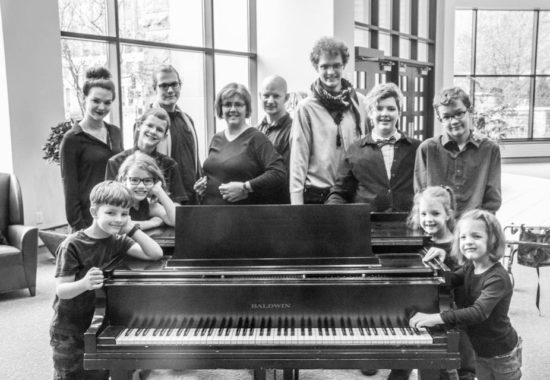
“(The Division of Specialized Care for Children) has been such a blessing in so many ways... It was really nice to have someone who was on my side looking out for me and helping me. ”
— Christie Lyons, mother of former DSCC participant Natalie
‘Someone who was on my side’
Christie Lyons is the mother of 10 children. She jokes that she and her husband “ended with a bang” with the birth of their twin daughters, Natalie (Tallie) and Patricia (Tricia).
Tallie and Tricia arrived 28 weeks premature. Tallie experienced complications and was later diagnosed with cerebral palsy.
The condition, which affects her mobility, made her eligible to enroll with the University of Illinois Chicago’s Division of Specialized Care for Children (DSCC).
Watch the video below to learn how DSCC helped the Lyons family through a major surgery for Tallie that greatly improved the muscle tone and tension in her legs.
The Kojro-Badziak Family
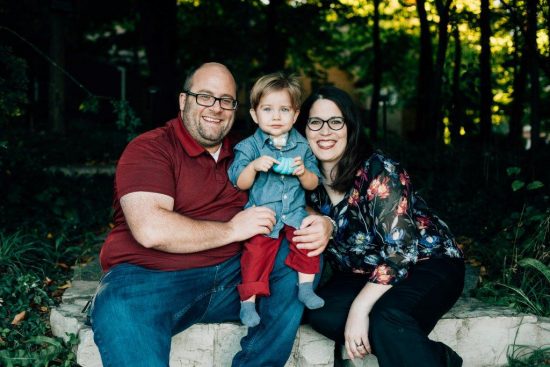
“(Our DSCC Care Coordinator Sony) is just phenomenal. He is one of the kindest people I’ve ever known. I know I can turn to him for anything, and he’ll get back to me… it doesn’t go unappreciated.”
— Jennifer Kojro-Badziak, mother of Jakob
“I know I can turn to him for anything.”
Jennifer and Jason Kojro-Badziak first laid eyes on their son in the neonatal intensive care unit of an Indiana hospital.
The couple from Illinois was eager to adopt and start a family after suffering a miscarriage. Jakob was 2 months old at the time. The adoption agency had waited until Jakob was stable to arrange the first meeting with the hopeful parents-to-be. 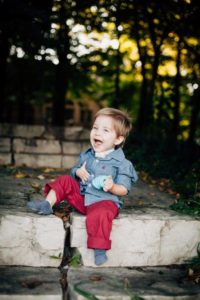
“We got a call that there was a little boy looking for a forever home,” Jennifer said. “He was on a ventilator, attached to everything, and two nurses had to lift him out of the crib to get him into my arms.”
Jennifer and Jason immediately fell in love and committed to the adoption.
“It was a whirlwind at that point. We became instant caregivers,” Jennifer recalled. “That Tuesday, I got a phone call from one of his doctors that oxygen was not working, so we’d have to put in a trach (tracheostomy). I had no idea about any of this stuff.”
Jennifer said the University of Illinois at Chicago’s Division of Specialized Care for Children (DSCC) has helped her family navigate the world of raising a medically complex child over the last three years.
“Survival mode”
Jakob was born 10 weeks early during an emergency cesarean section. His lungs hadn’t fully developed. He also experienced a brain bleed and hydrocephalus.
After meeting his parents, Jakob eventually was transferred to Ann and Robert H. Lurie Children’s Hospital of Chicago to be closer to home. Jakob then went to a transitional care facility, where Jennifer and Jason learned about DSCC and met their first Care Coordinator.
“She came to Almost Home Kids and met with me and that’s how I learned about everything,” Jennifer said.
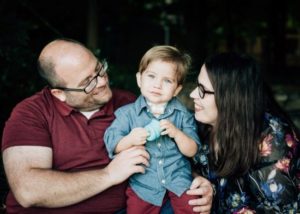 Jakob would need in-home nursing to support his medical needs, so he was enrolled in the Home Care Program. DSCC operates this program on behalf of the Illinois Department of Healthcare and Family Services (HFS).
Jakob would need in-home nursing to support his medical needs, so he was enrolled in the Home Care Program. DSCC operates this program on behalf of the Illinois Department of Healthcare and Family Services (HFS).
Jakob’s DSCC Care Coordinator worked with Jennifer and Jason to prepare for his transfer home. This process included helping them select a nursing agency of their choice.
The Kojro-Badziaks welcomed Jakob home in November 2016 when he was 7 months old. The first few weeks were intense as they learned to care for his tracheostomy, oxygen needs and gastrostomy tube at home.
“Everything was survival mode,” Jennifer said.
Jakob’s medical equipment raised their utility costs significantly, so their Care Coordinator helped them receive financial aid for their bill.
“Keep pushing forward”
Jakob is now 3 years old and becoming more mobile and independent. The Kojro-Badziaks’ current Care Coordinator, Sony, continues to provide helpful resources and information.
“(Sony) is just phenomenal. He is one of the kindest people I’ve ever known,” Jennifer said. “I know I can turn to him for anything, and he’ll get back to me… it doesn’t go unappreciated.”
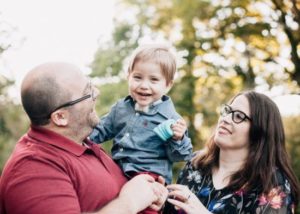 This support, along with the home nursing and Jakob’s therapies, has helped him come a long way. Jennifer said Jakob is now a precocious toddler with a sweet, playful sense of humor who started preschool in April 2019.
This support, along with the home nursing and Jakob’s therapies, has helped him come a long way. Jennifer said Jakob is now a precocious toddler with a sweet, playful sense of humor who started preschool in April 2019.
“He’s not on oxygen anymore, and he’s on real food blends (through his g-tube). My husband and I have learned how to change his trach,” Jennifer said.
“We never knew if he was going to be able to walk. We were told that wasn’t going to be a possibility, but he’s walking.”
Jennifer said she encourages other special needs parents to always ask questions and talk to as many people as possible to get the resources they need.
“It’s going to be difficult but you need to keep pushing forward and take everything day by day.”
As they develop goals for their son’s future, the Kojro-Badziaks go back to their first meeting with Jakob and the hope that filled their hearts.
“What I first told him and what I’ve said from the beginning is I want him to get bigger, stronger, smarter and faster than me,” Jason said. “He’s already faster than me at age 3. He keeps getting stronger and smarter. I’m just enormously proud of him.”
The Whitted Family
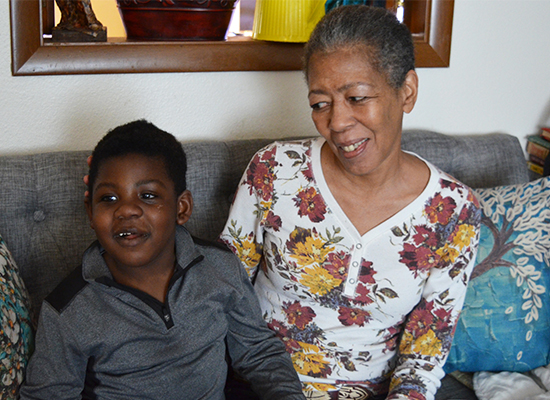
“It takes a village, it’s true. The Division of Specialized Care for Children is part of that village -- an integral part.”
— Nedra Whitted, grandmother to Stanton
“It takes a village.”
Stanton Whitted is a little superhero, according to his grandmother Nedra.
His short life has been a series of new diagnoses, physical and developmental delays, medical procedures, therapies and treatment plans.
With the help of the University of Illinois at Chicago’s Division of Specialized Care for Children (DSCC) and other community supports, Nedra says Stanton is now a precocious 5-year-old showing more potential than she thought possible.
“I see him blossoming. I’m seeing him grow. I’ve seen how far Stanton has come because I utilize the services” Nedra said. “I really think he’s a little superhero and he’s been given a chance with all these little angels that have been following him through his journey. (DSCC) and your staff have been some of those angels.”
“A job in itself”
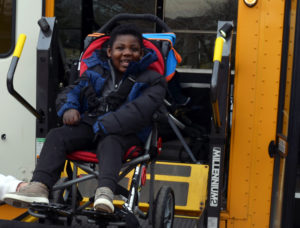
Stanton Whitted gets off of the school bus after his school day at the Illinois School for the Deaf.
When Stanton was born, he had trouble breathing. Doctors soon discovered he had blocked nasal passages. He needed surgery to fix the issue and stayed in the neonatal intensive care unit.
While in the NICU, doctors also found Stanton had agenesis of corpus callosum, which is a partial or complete absence of an area of the brain that connects the two cerebral hemispheres. As a result, Stanton is missing part of his pituitary gland, which regulates his body’s growth hormones.
He has problems with his depth perception and the signals he receives from his brain to move his limbs. Therefore, he has trouble walking long distances and falls often.
As he grew older, Stanton was also diagnosed with hearing loss, sleep apnea, vision problems and Landau-Kleffner Syndrome, a rare form of epilepsy that causes seizures and speech delays.
“It seemed like every single time he went to the doctor, he had some new condition,” Nedra recalled. “It’s a job in itself just to keep up with his medical issues.”
“A translator to the medical world”
Before Stanton turned 3, one of Stanton’s Early Intervention providers told Nedra about DSCC. He became enrolled with the Chicago Regional Office.
“That’s when everything started happening,” Nedra recalled.
“It’s not just a service that’s provided, it’s information on the diagnoses. It’s almost like a translator to the medical world,” she said of DSCC’s Care Coordinators. “You realize how valuable it is to be able to speak with someone who knows about different programs and support groups.”
DSCC was able to help pay for a gait trainer and other equipment to help Stanton’s mobility.
In 2017, DSCC invited Nedra to take part in the Institute for Parents of Preschool Children who are Deaf or Hard of Hearing. The Institute is a free one-week program at the Illinois School for the Deaf campus in Jacksonville. Parents and caregivers attend daily lectures by experts in the field to learn about raising a child with hearing loss. The children attend classrooms overseen by experienced teachers of children who are deaf or hard of hearing.
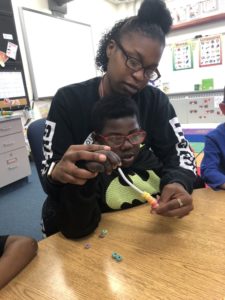
Stanton Whitted works on a project with his aide at Illinois School for the Deaf.
Nedra said the experience was life-changing. She fell in love with the Illinois School for the Deaf and decided to move from Chicago to Jacksonville so Stanton could attend full-time.
“Somebody I could call”
Robin Mahnken from the Springfield Regional Office became the family’s DSCC Care Coordinator. Nedra said Robin helped Stanton transition to new providers in central Illinois.
DSCC also gave Nedra access to sign language videos, where she can learn to sign at her own pace in her own home. These lessons help Nedra keep up with communication methods that Stanton learns at school.
Nedra doesn’t drive, so Robin helps her arrange transportation to Stanton’s medical appointments.
Immediately after the move, Nedra and Stanton still had to commute to Chicago for his medical care.
“Robin worked with all of the Rush (University Medical Center) people to get all of his appointments scheduled and find me housing in the medical district. So, instead of us having to come back three or four times in a month, we were able to get all of our appointments within two or three days,” she said.
When Stanton undergoes medical procedures, Nedra says Robin will check in often. She’s even gone up to the hospital and stayed with Nedra while she waits.
“I’m kind of isolated here, and she’s somebody I could call to give updates to,” she said.
“It takes a village”
Robin also helps Nedra find local specialists who understand Stanton’s unique health challenges.
Because of his frequent falls, Stanton has several broken teeth that need fixed. He’ll need sedation and has experienced complications with anesthesia in the past. Robin is helping them find a pediatric dentist who can safely address these issues.
“How hard would it be for me to go through this by myself with trying to find somebody who could do his dental work that would respect my knowledge as a grandma,” Nedra said.
“Robin’s seen the growth, physically and emotionally, so it’s good to have somebody there who you feel cares for your kids.”
Nedra says Stanton is a living testimony to how programs like DSCC and Early Intervention services pay off.
“People don’t understand how much it has taken to get him where he is right now… It takes a village, it’s true. The Division of Specialized Care for Children is part of that village — an integral part,” Nedra said.
“I now have a functioning, laughing, happy boy who has a future.”
The Jamison Family
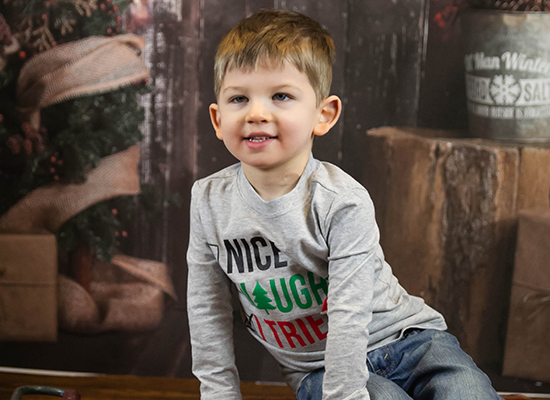
“I can’t say enough about the DSCC organization and how amazing it is to have something like this to help you through these hard times.”
— Trisha Jamison
“That’s just what I need.”
Trisha Jamison doesn’t like to sugarcoat things.
Her son’s journey with a rare form of epilepsy has been a hard battle and an emotional roller coaster.
“To watch your small child have a seizure for an hour and be so helpless is the absolute worst feeling in the world,” Trisha said.
Everett Jamison, 3, has Dravet syndrome (DS), which causes frequent and/or prolonged seizures and developmental and cognitive delays. He’s been enrolled with the University of Illinois at Chicago’s Division of Specialized Care for Children (DSCC) since 2017.
Trisha said Everett’s DSCC Care Coordinator has provided valuable emotional support and resources to navigate the medical, social and financial issues that come with Everett’s condition.
“Sarah Kelly is an amazing person and she has helped us with so much,” Trisha said. “For example, I reached out to Sarah about help getting us a cooling vest for Everett.”
Everett typically didn’t go outside because heat can trigger his seizures. Additionally, one of his medications doesn’t allow his body to sweat, and DS children have a hard time regulating their body temperature.
“Just like that, Sarah was hard at work and got us one, “Trisha said.
“She’s also someone I can vent to and bend her ear. I have emailed her about issues with doctors and she just listens to me, and that’s just what I need.”
With the stress of raising a child with special needs, Trisha said it’s important to have someone on the outside who can listen.
Sarah was also a valuable resource to the Jamisons when they needed to find a local pharmacy to do compounding for one of his medications.
“I can’t say enough about the DSCC organization and how amazing it is to have something like this to help you through these hard times,” Trisha said.
Though many challenges still exist, Trisha said Everett continues to work hard and exceed expectations.
Doctors initially told the Jamisons that Everett wouldn’t walk but with frequent physical therapy, he started taking steps in fall 2018.
As Everett grows, his seizures are evolving and becoming more frequent with different triggers, Trisha said.
“He’s pretty medically fragile these days,” she said. “However, even with all of these changes happening, he is walking A LOT. He’s still not talking, but he is so smart and I can see it.”
Trisha has channeled her efforts into raising awareness and funds for epilepsy research and support.
With the help of a friend who has epilepsy, Trisha started the successful “Seize Hope” fundraiser and awareness walk in her community. The proceeds go to the Dravet Syndrome Foundation, the LaSalle County Epilepsy Foundation and local families affected by epilepsy.
“We will continue to do this every year because it’s been proven our community supports us,” Trisha said.
“I do want to reiterate how important DSCC is in my family’s life,” she added. “Sarah Kelley is not just an ear to bend, a resource for us, but over the years I consider her a friend. She goes above and beyond to help and guide me.”
Trooper’s Family
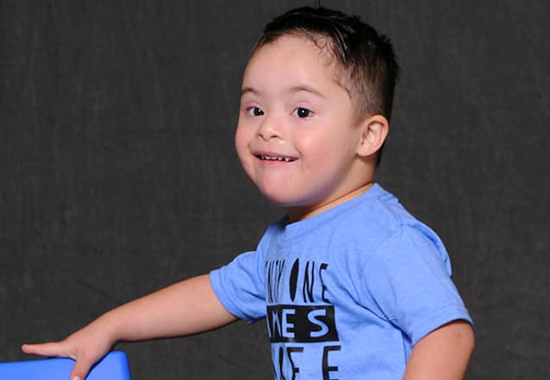
“The reassurance you gave me that (my Care Coordinator) was here and he understood and if I needed anything, I could just call or come to the office and it was OK. There was nothing we couldn’t handle.”
— Trooper's mom, Brandy Santiago
“You’re not alone.”
Parents can feel many emotions when their newborn is diagnosed with a medical condition.
Brandy Santiago was pregnant with her son Trooper Orosco when he was diagnosed with trisomy 21 (Down syndrome). Trooper then failed his newborn hearing screening after birth.
Brandy recalls feeling overwhelmed for the moment.
“But I knew it was going to be OK. I needed to learn the language of having a child with Down syndrome and then learn the language of having a child with hearing loss, too,” she said. “It’s like throwing yourself in a foreign country and you have to learn that language today. There were lots of mixed feelings for sure.”
Brandy says the University of Illinois at Chicago’s Division of Specialized Care for Children (DSCC) has helped her family navigate this new world over the last four years.
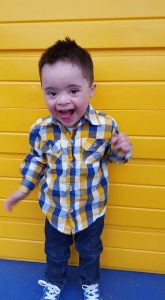 “Once we were introduced to (DSCC), I was given a guide,” she recalled. “I wouldn’t have known this world unless I was introduced to it, and that’s where you guys came in.”
“Once we were introduced to (DSCC), I was given a guide,” she recalled. “I wouldn’t have known this world unless I was introduced to it, and that’s where you guys came in.”
After failing his newborn hearing screening, Trooper had a follow-up appointment. It confirmed conductive hearing loss in both ears.
DSCC learned of Trooper’s failed screening and reached out to his family. Trooper was just a few weeks old when a DSCC Care Coordinator met with Brandy at her home to recommend next steps and provide support.
“It was a relief and a feeling of you’re not alone because you feel lonely that you don’t know what you’re going to do,” Brandy said. “After (our Care Coordinator) left, I felt like we had some type of start. Before that, I didn’t have a start.”
Within three months, Trooper had his first set of hearing aids. He also started feeding therapies, occupational and physical therapy and Developmental Therapist Hearing Services.
“Going through that first year was just basically a lot of struggles with the whole process of getting ear molds (for hearing aids) with a baby,” Brandy said. “That was my biggest trial for our first year and then he got sick a lot.”
Brandy said she was thankful to have her own personal “Yellow Pages” of resources in the form of DSCC. She also appreciated the check-ins from her Care Coordinator.
“The reassurance you gave me that (my Care Coordinator) was here and he understood and if I needed anything, I could just call or come to the office and it was OK. There was nothing we couldn’t handle, even though it might have seemed in that moment like I couldn’t handle it,” she said.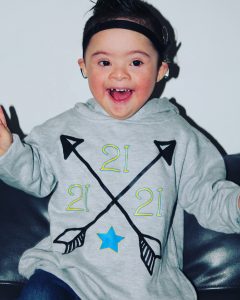
For example, Brandy recalled an instance when Trooper’s daycare provider lost his hearing aids.
“I was spastic,” she recalled. “So that’s one of those situations where I call him and ask, ‘What do I do?’
“He said, ‘Don’t worry, we’ll see if it’s covered and if not, we’ll try this,’’ Brandy said. “It was covered and he got it all taken care of.”
In 2017, Trooper’s Care Coordinator told Brandy about a program that would be a huge help to her family – the Institute for Parents of Preschool Children who are Deaf or Hard of Hearing.
The Institute is a free one-week program held on the Illinois School for the Deaf campus in Jacksonville. It includes daily lectures by experts in the field to learn about raising a child with hearing loss. Other activities include meeting in small groups to discuss specific concerns and connecting with other caregivers. During the Institute, children attend classrooms overseen by experienced teachers of children who are deaf or hard of hearing.
Trooper, his parents and one of Trooper’s older brothers all attended and had a great experience.
Brandy said she loved the opportunity to connect with other families of children with hearing loss. She also formed a close bond with another mom and the two remain good friends.
After the Institute, Trooper’s Care Coordinator helped connect his family with cued speech classes.
Today, Trooper is a rambunctious 4-year-old with energy to spare. He enjoys going to preschool and is working on ways to communicate.
“His name fits him literally,” Brandy said.
Brandy also passes on information about DSCC to other families of children with special healthcare needs.
“It can be an overwhelming feeling, but it’s OK, (DSCC) is there for you,” she said.
Zayd’s Family
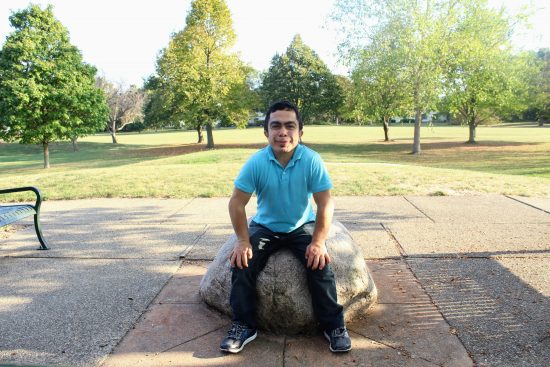
“(DSCC Care Coordinators and staff) were a shoulder to lean on. They showed that they genuinely cared about my well-being as I was growing up and through school. They really showed a lot of love and support for all of the hard things that we were going through."”
— Former participant Zayd Jawad
“These are people who really cared about me.”
Growing up with a rare disease can seem like an endless string of doctor’s appointments, painful procedures, puzzled expressions from providers and a lack of answers.
Zayd Jawad knows these feelings all too well. The 21-year-old was born with Hunter syndrome, a lysosomal storage disorder that affects his bodily systems and physical growth and development.
The University of Illinois at Chicago’s Division of Specialized Care for Children (DSCC) was a constant presence throughout his childhood and adolescence, providing much-needed reassurance to Zayd and his parents.
“They were a shoulder to lean on. They showed that they genuinely cared about my well-being as I was growing up and through school. They really showed a lot of love and support for all of the hard things that we were going through,” Zayd said.
“As you’re growing up as a kid and going to all these different appointments and it takes so much of your time, you think, ‘That’s all there is to life,’” Zayd said. DSCC’s interest and support of his goals and life outside of the doctor’s office made him feel “more like a whole person.”
This support gave Zayd hope. It also inspired him to share his story as an adult and promote the importance of patient-centered care in the healthcare field.
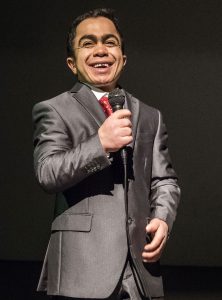
“I have the ability to connect with people and I can use it to help people.”
“Everything was going to be OK”
Zayd was diagnosed with Hunter syndrome at age 5. The genetic disorder means his body is missing a key enzyme for his cells to function properly. The breakdown in function causes progressive damage to his lungs, heart and other organ systems. The missing enzyme also affects his hearing, mobility and immune system and has stunted his growth.
“I’m fun-sized. I’m good for traveling,” Zayd jokes about his 4-foot, 10-inch frame.
The Jawad family first enrolled with DSCC around 2003 to help cover the cost of Zayd’s hearing aids. Their Care Coordinator soon became a lifeline for the family.
“The biggest thing DSCC has done was giving guidance through a very complicated arena of people, places and payment. For example, they’d help us pay for services, but they’d also help refer us to services, such as orthopedic surgeons or therapies, and they referred us to ones they thought would be the best fit for me,” Zayd said. “Because of my condition and how rare it is, it was hard to find those providers.”
When Zayd turned 10, DSCC helped the Jawad family sort through insurance options so Zayd could receive regular enzyme replacement therapy, which he continues today. The therapy doesn’t cure his disease but slows down the effects, improving his quality of life.
“They took our hands and walked us through those complicated processes of insurance,” Zayd said. “When I started getting my enzymes, it’s one of the most expensive medications in the world. We had absolutely no idea how we could pay for it.”
Zayd said his Care Coordinator was like a second mother to him. And most importantly, she helped relieve his parents’ anxieties and fears and provided a partner they could trust.
“Children are really affected by their parents, and I felt more at ease because they had support and much less tension in the household because of DSCC,” Zayd recalled. “These are people who really cared about me and they made me feel like everything was going to be OK.”
“My story is important”
This personal connection was important to Zayd, especially since he often felt socially awkward and isolated from his peers during high school. After graduation, he enrolled at the local community college and took a public speaking class. He immediately found his passion and a newfound confidence.
Soon after, he received an invitation from his high school to be the keynote speaker for their disability awareness month.
“When I went there, I felt more alive than I ever did before. It got me started on this idea that my story is important and that I have the ability to connect with people and I can use it to help people,” Zayd said. “I realized I could help (patients) feel like they’re real people and really connect with them, kind of like DSCC did for me.”
Zayd is now studying communication with a focus on health at the University of Illinois at Urbana-Champaign. He hopes to one day run a healthcare company and speak to providers about the importance of focusing on patients’ unique values, strengths and overall wellbeing.
Zayd currently has a summer internship working as a patient liaison at his local hospital and is building his public speaking experience. He hopes youth with disabilities can learn from his story and know they are much more than their condition.
“A lot of the times when you have a disability, especially something that makes you seem a lot different than others, you get in this fixed mindset that you’re never going to get better,” Zayd said.
He challenges others to go outside of their comfort zone and work hard to master skills in areas where they may feel awkward or uncomfortable. He says it’s also important to practice gratitude, even when you have severe medical needs.
Lastly, but most importantly, Zayd encourages youth with disabilities to pinpoint their passion.
“Find something that you love and get really, really good at it,” Zayd said. “Then, as a young adult, you will feel a sense of confidence and pride.”
The Doueihi Family
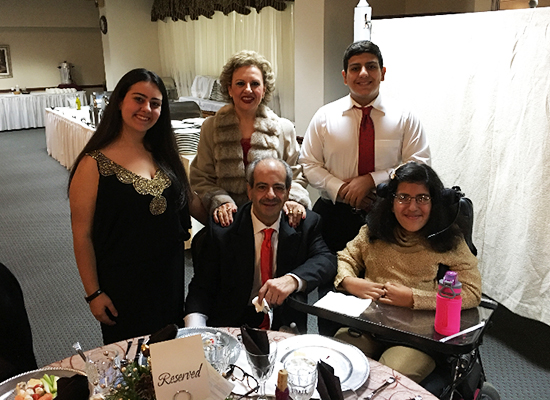
“DSCC came at a time when we really, really needed it... (Our Care Coordinator) Sarah Kelly has tried everything in her power just to make our life easier. She is extremely, extremely helpful, kind and caring.”
— George Doueihi
“It gives you hope that somebody cares.”
Sabrina Doueihi was a typically-developing infant when her doctors discovered a fatty tissue on her spinal cord. They didn’t know how it would affect her or what the long-term prognosis would be. A specialist could only tell her family one thing for certain – her ability to move was miraculous.
“He said, ‘As a physician, from what I see on the MRI, she shouldn’t be moving at all,” her father, George, recalled. “They called her a miracle child.”
The fatty tissue, called a lipoma, couldn’t be removed without risking Sabrina’s life. Over the years, the lipoma started to squeeze her spinal cord as she grew and affect her mobility. Now 16, Sabrina has lost the use of her limbs and uses a motorized wheelchair.
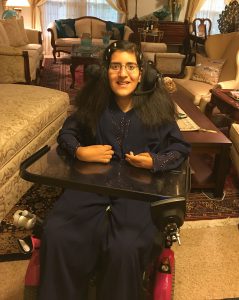
Sabrina Doueihi
The Doueihis say the University of Illinois at Chicago’s Division of Specialized Care for Children (DSCC) has helped them adjust to Sabrina’s changing needs and provide the right equipment and supports to foster her independence.
“DSCC came at a time when we really, really needed it,” George said. “(Our current Care Coordinator) Sarah Kelly has tried everything in her power to just make our life easier.
“She is extremely, extremely helpful, kind and caring,” he added. “She does not just go the extra mile for you; she goes 2,000 miles just to help you.”
After the lipoma on her spine was discovered, Sabrina started undergoing physical therapy and was referred to DSCC. DSCC provides free care coordination for youth with nervous system impairments and other special healthcare needs.
Sabrina’s DSCC Care Coordinators over the years have provided emotional support to the Doueihis and connected the family to valuable resources.
Their current Care Coordinator Sarah also helped the family navigate the change from private insurance to All Kids after George retired. DSCC was able to help the Doueihis pay for equipment not covered by their insurance as Sabrina became weaker and eventually unable to walk. This equipment includes an exterior wheelchair ramp and a wheelchair lift for their van.
Sabrina said she was delighted when the ramp was installed in their garage.
“I remember when I would get home from school, my dad was at work, so my mom had to help me get inside and there were steps, and it was hard on her to get me up,” she said. “Once we go the ramp, I just remember how relieved I was that my mom didn’t have to wrestle with me to get me inside.”
Sarah also has attended one of Sabrina’s individualized education program meetings to ensure her changing needs were being met at school.
“(Sarah) always wants to know what else she can do for us. Without her help, we probably wouldn’t be able to do what we’re doing right now with Sabrina,” George said. “She always calls and asks about Sabrina and how everything is going to make sure everything is all right. As a parent, you really appreciate that… it gives you hope that somebody cares.”
Sabrina said having the appropriate equipment and services to live as independently as possible is vital.
“It’s a lifesaver,” Sabrina said. “Growing up, I was always different from other kids but my parents never treated me different… It gives me confidence and maybe I don’t need someone around me 24-7 just to do something simple.”
Sabrina is currently a straight-A student in general education classes and getting ready to complete her sophomore year of high school. She currently hopes to attend the University of Illinois in Urbana-Champaign and major in pre-law so she can become an assistant U.S. attorney.
“I could speak up against oppression or discrimination against people from different races, sexual orientations and people with disabilities because a lot of people have helped me in my life and I want to give back to them,” Sabrina said. “I want to be a positive force in the world because I have that opportunity. My parents have given me everything I need to do that.”
Payton’s Family
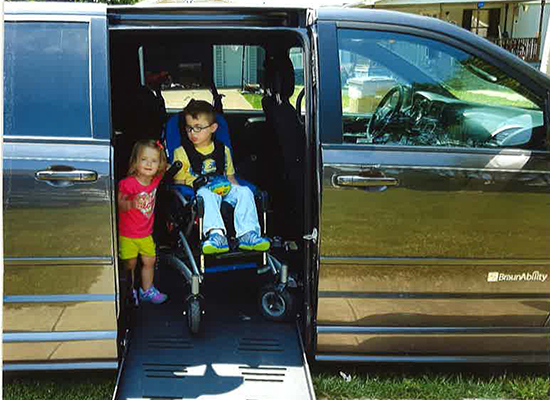
“(Our Care Coordinator) Beverly went above and beyond... If Beverly wasn’t able to help with something, she can always point me in the right direction of where I could turn.”
— Payton's mom, Kristy
“Don’t be afraid to ask.”
Eight-year-old Payton was born with a gene mutation so rare that it doesn’t have a name. The condition affects the STXBP1 gene and causes seizures, developmental delays, nonverbal communication and abnormal muscle movements.
“There are less than 250 people (with the mutation) that we know of worldwide,” Payton’s mom, Kristy, explained. “It is almost like a spectrum-type diagnosis… Doctors just don’t know much about it.”
What Payton’s family does know is that his symptoms are severe. He cannot walk or sit up and is nonverbal. However, he has no problem letting his happy, easygoing personality shine through. Payton loves his little sister, Hunter, and doing special extracurricular activities, like horseback riding and water therapies.
Kristy says the University of Illinois at Chicago’s Division of Specialized Care for Children (DSCC) has helped provide the accommodations, equipment and resources needed to help Payton stay active and comfortable as he grows.
Payton became enrolled with DSCC six years ago. His family qualified for financial assistance from DSCC to install a ramp in their home for Payton’s wheelchair.
“He’s getting bigger, and we were starting to have difficulties getting him in and out of our vehicle and his car seat,” Kristy said. “I contacted (our Care Coordinator) Beverly and she told me about the ways DSCC could help.”
DSCC was able to provide some financial assistance to modify the van with a lift, but the remaining price tag was still too expensive for the family to afford. Beverly then used her connections within the community to link Payton’s family with two charitable organizations to pay most of the remaining cost.
“Beverly went above and beyond,” Kristy said. “It’s been awesome. Now I can wheel him in and strap him down, and it’s so much easier without having to get him out of the chair and do multiple transfers.”
The modification helps the family of four’s busy lifestyle, especially now that Payton is in second grade and is increasingly involved in activities outside of the home.
Kristy said DSCC’s assistance and Beverly’s patience and hard work have helped make her family’s lives much easier. She also values Beverly’s knowledge of community resources and services and encourages other families to work with DSCC and ask what may be available to help their family.
“If Beverly wasn’t able to help with something, she can always point me in the right direction of where I could turn,” she said. “You just need to ask the question, and don’t be afraid to ask.”



